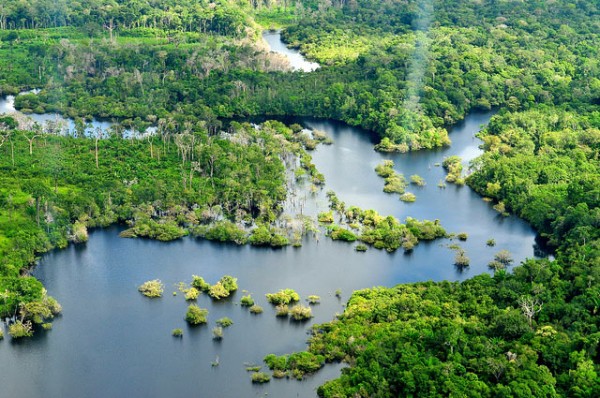Readers Question: Endangered rain forests, wild fish, elephants and more are examples of the tragedy of the commons. What would economists recommend to save, rain forests or fish stocks?

Firstly, the tragedy of the commons is a situation where there is overconsumption of a particular product / service because rational individual decisions lead to an outcome that is damaging to the overall social welfare.
The problem with rain forests is that people may feel an economic incentive to chop down trees in order to make a business, e.g. farming, wood for furniture. On their own – a decision to cut down a few trees don’t seem to make much difference. If you buy a table made with wood from a rainforest it doesn’t make that much difference. But, if everyone takes these decisions, we end up with overconsumption and eventually this precious resource is lost.
Economic policies to save the Rainforest
1. Laws and regulations by governments to make areas of rainforest protected.
This is the simplest and easiest. The Brazilian government can simply disallow firms from cutting down more trees, and legally protect rain forests. The problem is that governments may not want to do this because they see it as viable economic resource they need to make use of.
2. Global co-operation. If we ban cutting down rain forests, some countries may lose economically – Brazil, Indonesia e.t.c. But, the world will benefit from reduced global warming and the benefits of saving rain forests. In an ideal world, all major economies could make a financial contribution to countries who promise to save their rain forests. Therefore countries like Brazil and Indonesia don’t feel like they are losing out. All countries are paying a small amount to gain the bigger long-term benefit of saving the rain forests.
For more ideas, I looked at this page: 10 things you can do to save the rainforest
Primarily these rely on trying to change consumer behaviour. But, how could an economist make the changes more widespread and not optional?
1. “Palm oil, found in half of all processed foods in the US, is a key contributor to rainforest deforestation”
In this case we could tax palm oil which is taken from land which used to be rainforest. Increasing the price of Palm Oil, would discourage consumption and encourage consumers to buy other oils.
The problem is that individual taxes on palm oil will have administration costs. It may also be difficult to know whether Palm oil has come from former areas of rainforest. but, in theory a tax will reduce demand. The money raised could be used to buy rainforest land to protect it.
2. “Give money to Rainforest Foundation US.” How does an economist encourage charitable giving? This is a tricky one. Here we are relying on consumers to gain utility from the feeling of altruism.
3. “60-70% of deforestation in the Brazilian Amazon results from cattle ranching. Brazil is the world’s 2nd largest beef exporter.” Tax Brazillian beef. The major economies could place an embargo on Brazillian beef, unless Brazil promises to protect all rain forests.
However, Brazil may feel hard done by. Brazil may feel why do OECD countries make Brazil protect the environment when they do little to reduce pollution themselves? But, a deal could involve the threat of sanctions, plus financial reward for protecting rain forests.
4. “Teach Your Children.” Advertising campaigns to raise awareness of environmental issues. Perhaps this environmental education could be funded by all the tax on Brazilian beef and Palm Oil.
5. “Avoid furniture and other products made from threatened rainforest woods like: Mahogany, Rosewood and Ebony.” Again an economist would resort to taxing these kinds of wood, or even prohibiting their use.
However, some may criticise the government for restricting choice. Does the government have a right to prohibit / tax certain types of wood? It becomes a choice – which is more important – saving rain forests or protecting the right to use Mahogany?
6. “Reduce fossil fuel consumption. Approximately 70% of the entire Peruvian Amazon in now leased by oil companies.”
8. “Travel Green. By bike, walking”
The economist will resort to his favourite of taxing fossil fuels and oil and subsidising encouraging green methods of transport.
The free rider problem in saving the rainforest
The economist case relies on taxing goods to make people pay the full social cost. This discourages use of goods which damage the environment.
A practical difficulty is that there is the danger of a free rider problem.
Suppose the UK government imposed higher taxes on petrol, mahogany, beef and Brazillian Palm Oil – this would reduce the pressure on Rainforest resources. But, if other countries didn’t impose these taxes, the UK policies wouldn’t make much difference to this global problem. Then the difficulty is that countries think – why should we impose unpopular taxes when other countries are not going to bother? There is a temptation to free ride on the efforts of other countries to protect the environment, but do little yourself.
Therefore, there needs to be strong global co-operation and global agreements to jointly tackle the problem.
The post also suggests that individuals can make a difference by changing their preferences. This creates an economic incentive for firms to choose more environmentally friendly goods. This will help, if enough people do it. The economist doesn’t have too many suggestions for making people more altruistic and put environmental concerns above utilitarian concerns. Economics has its limits.
Related
